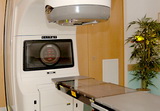Cancer Radiotherapy
Cancer Radiotherapy is a term used to describe a special type of therapy which uses ‘radiation’ usually in the form of X-rays to treat cancer. X-rays were originally discovered back in 1895, since then it has been used in medical science both for diagnosis as well as treatment of various conditions. Over the past few years doctors have gained extensive knowledge into the use of radiotherapy, with now around 40% of cancer patients undergoing radiotherapy as a major element of their treatment.
Cancer Radio therapy can be administered in a number of different ways which includes:
- External radiotherapy i.e. therapy given from outside of the human body is a newer form of radio therapy. The most commonly used radio waves are X-rays followed by Cobalt irradiation with some other rare particles like protons.
- Internal radiotherapy is given from inside of the body via a liquid which needs to be ingested by the subject. The liquid is mostly radioactive material which needs to get close to the affected area in order for it to work.
Cancer Radio Therapy and how it works?
Cancer radiotherapy works by destroying the cancer cells in the area which is being exposed to the radiation. However, even though unaffected cells are also destroyed by this radiation the new cells which grow later on are cancer free.
Radiotherapy for cancer is usually subject to a schedule based on various days and weeks depending on the condition. Every part of the treatment process is referred to as simply ‘fraction’, and these fractions are usually given once in twenty four hours from Monday to Friday with weekends usually being a rest period for patients. The good cells which are damaged in the process are later replaced as the body begins to heal itself. But this mainly depends on the cell type and the radiotherapy being used. However, for cells which cannot be replaced there can be some adverse effects some of which can end up being permanent.
Cancer radiotherapy concerns
Having concerns about cancer radiotherapy is perfectly normal, especially owing to the information which most people get from magazines, newspapers and on websites which mislead people. It is important to understand that radiotherapy is not just used for cancer but to treat many other types of condition as well such as tumors and TB. The success rate of cancer radiotherapy is comparatively higher and is virtually painless. It is important that you speak to your doctor about your worries so that your concerns can be sorted out.
Side effects of cancer radiotherapy
The side effects of cancer radiotherapy can vary depending on a number of factors which includes the type of therapy used, the type of cancer being treated, and patient’s own condition at the time of treatment, etc. However, many of the side effects that people end up living with are not painful or disabling, and they are better off than living a life with cancer. But if you are concerned about the side effects you may end up with always speak to your doctor to find out more about what you can expect.

